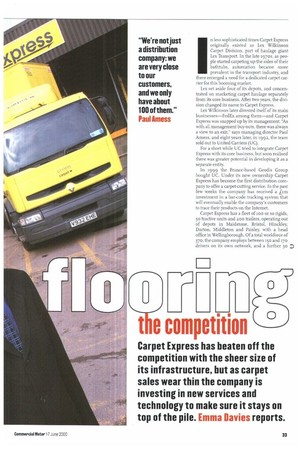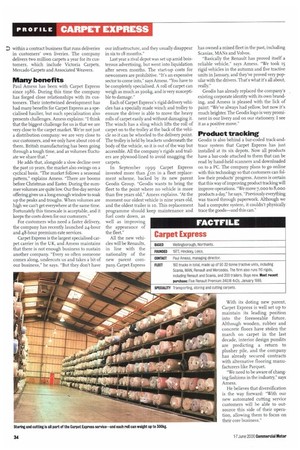the competition
Page 35

Page 36

If you've noticed an error in this article please click here to report it so we can fix it.
Carpet Express has beaten off the competition with the sheer size of its infrastructure, but as carpet sales wear thin the company is investing in new services and technology to make sure it stays on top of the pile. Emma Davies reports.
n less sophisticated times Carpet Express originally existed as Lex Wilkinson Carpet Division, part of haulage giant Lex Transport. In the late 197os, as people started carpeting up the sides of their bathtubs, automation became more prevalent in the transport industry, and there emerged a need for a dedicated carpet carrier for this booming market.
Lex set aside four of its depots, and concentrated on marketing carpet haulage separately from its core business. After two years, the division changed its name to Carpet Express.
Lex Wilkinson later divested itself of its main businesses—FedEx among them—and Carpet Express was snapped up by its management. "As with all management buy-outs, there was always a view to an exit," says managing director Paul Ames s, and eight years later, in 1992, the team sold out to United Carriers (UC).
For a short while UC tried to integrate Carpet Express with its core business, but soon realised there was greater potential in developing it as a separate entity.
In 1999 the France-based Geodis Group bought UC. Under its new ownership Carpet Express has become the first distribution company to offer a carpet-cutting service. In the past few weeks the company has received a
investment in a bar-code tracking system that will eventually enable the company's customers to trace their products on the Internet.
Carpet Express has a fleet of roc or so rigids, 5o tractive units and 200 trailers, operating out of depots in Maidstone, Bristol, Hinckley, Darton, Middleton and Paisley, with a head office in Wellingborough. Of a total workforce of 370, the company employs between 15o and 170 drivers on its own network, and a further 5o
within a contract business that runs deliveries in customers own liveries. The company delivers two million carpets a year for its customers, which include Victoria Carpets, Mercado Carpets and Associated Weavers.
Many benefits
Paul Amess has been with Carpet Express since 1986. During this time the company has forged close relationships with its customers. Their intertwined development has had many benefits for Carpet Express as a specialised haulier, but such specialisation also presents challenges. Amess explains: "I think that the biggest challenge for us is that we are very close to the carpet market. We're not just a distribution company: we are very close to our customers, and we only have about coo of them. British manufacturing has been going through a tough time, and as volumes fluctuate we share that."
He adds that, alongside a slow decline over the past to years, the market also swings on a cyclical basis. "The market follows a seasonal pattern," explains Amess. "There are booms before Christmas and Easter. During the summer volumes are quite low. Our five-day service offering gives us a long enough window to soak up the peaks and troughs. When volumes are high we can't get everywhere at the same time. Fortunately this timescale is acceptable, and it keeps the costs down for our customers."
For customers who need a faster delivery, the company has recently launched 24-hour and 48-hour premium-rate services.
Carpet Express is the largest specialised carpet carrier in the UK, and Amess maintains that there is not enough business to sustain another company. "Every so often someone comes along, undercuts us and takes a bit of our business," he says. "But they don't have our infrastructure, and they usually disappear in six to 18 months.'
Last year a rival depot was set up amid boisterous advertising, but went into liquidation after seven months. The start-up costs for newcomers are prohibitive. "It's an expensive sector to come into," says Amess. "You have to be completely specialised. A roll of carpet can weigh as much as 300kg, and is very susceptible to damage."
Each of Carpet Express's rigid delivery vehicles has a specially made winch and trolley to ensure the driver is able to move the heavy rolls of carpet easily and without damaging it. The winch has a sling which lifts the roll of carpet on to the trolley at the back of the vehicle so it can be wheeled to the delivery point. The trolley is held by brackets underneath the body of the vehicle, so it is out of the way but accessible. All the company's rigids and trailers are plywood-lined to avoid snagging the carpets.
In September 1999 Carpet Express invested more than Lim in a fleet replacement scheme, backed by its new parent Geodis Group. ''Geodis wants to bring the fleet to the point where no vehicle is more than five years old," Amess explains. "At the moment our oldest vehicle is nine years old, and the oldest trailer is ro. This replacement programme should keep maintenance and fuel costs down, as well as improving the appearance of the fleet."
All the new vehides will be Renaults, in line with the nationality of the new parent company. Carpet Express has owned a mixed fleet in the past, including Scan ias, MANs and Volvos.
"Basically the Renault has proved itself a reliable vehicle," says Amess. "We took 15 rigid vehicles in the autumn and five tractive units in January, and they've proved very popular with the drivers. That's what it's all about, really."
Geodis has already replaced the company's existing corporate identity with its own branding, and Amess is pleased with the lick of paint: "We've always had yellow, but now it's much brighter. The Geodis logo is very prominent in our livery and on our stationery. I see it as a positive move."
Product tracking
Geodis is also behind a bar-coded track-andtrace system that Carpet Express has just installed at its six depots. Now all products have a bar-code attached to them that can be read by hand-held scanners and downloaded on to a PC. The company plans to go online with this technology so that customers can follow their products' progress. Amess is certain that this way of improving product tracking will improve operations. "We move 7,000 to 8,000 products a day," he says, "Previously everything was traced through paperwork. Although we had a computer system, it couldn't physically trace the goods—and this can."
With its doting new parent, Carpet Express is well set up to maintain its leading position into the foreseeable future. Although wooden, rubber and concrete floors have stolen the march on carpet in the last decade, interior design pundits are predicting a return to plusher pile, and the company has already secured contracts with alternative flooring manufacturers like Parquet.
"We need to be aware of changing fashions in the industry," says Amess.
He believes that diversification is the way forward: "With our new automated cutting service customers will be able to outsource this side of their operation, allowing them to focus on their core business."








































































































